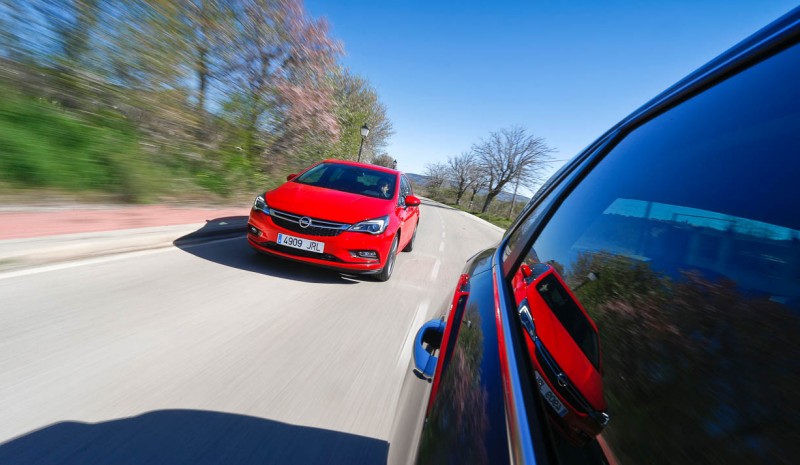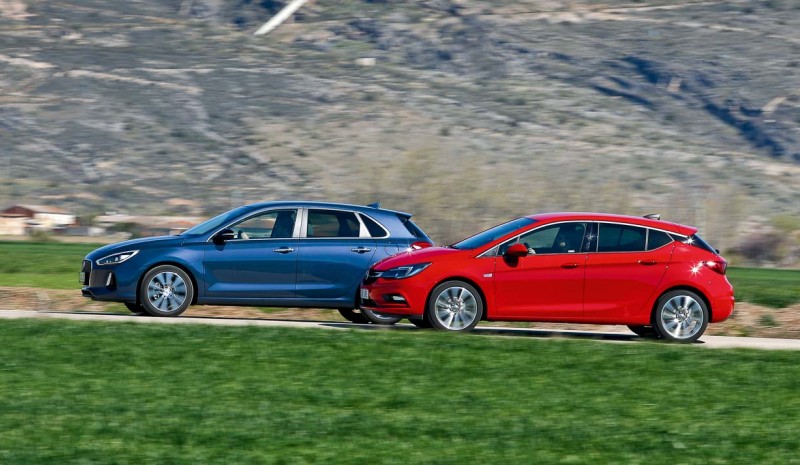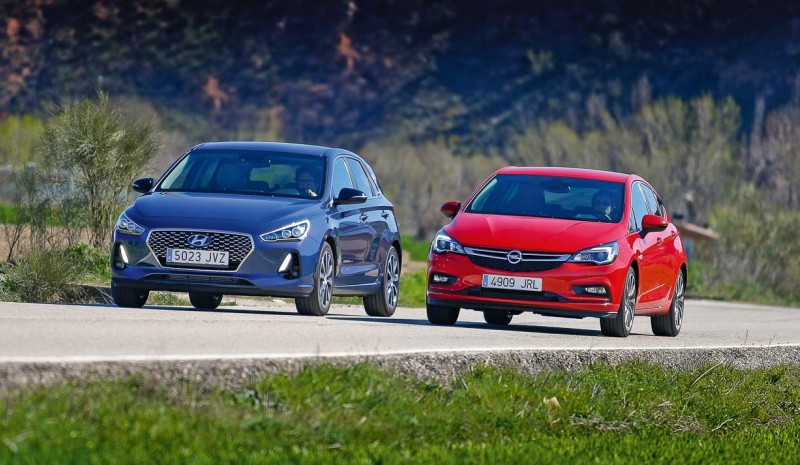Hyundai i30 1.4 T-GDI vs Opel Astra 1.4 Turbo: duel anti-Diesel
Hyundai is overcome by a new i30 which hides one goal: reach the best compact … where the Opel Astra is one of the references. We measure and compare in petrol versions.
That he Diesel is KO I doubt it, but that the gasoline is again booming it is a reality as a temple. And confirms the market today: back to prehistoric quotas last century, but still the Diesel exceeds 1.3 percent gasoline sales and hybrid models (including electrical) in the Spanish market. Time to time, because the thing keeps getting ugly for diesel, especially in urban environments. petrol, lurking for years, They seem to have found and "the time", and if the materialization and staging is, at least, similar to our two protagonists, it’s no wonder that the client recognizes that the time has come to experience a change of pace.
Hyundai i30 1.4 T-GDI: best Hyundai until today?
The ranges of almost all manufacturers are prepared to offer a excellent alternative to turbodiésel. Hyundai and Opel They are just two examples. They followed new trends developing engine now so fashionable three-cylinder, 1.0 liter each, perhaps, the engines focused on winning customers looking for a real alternative to diesel consumption and operating costs. Very efficient for certain uses, but not always round, the next step involves not only access and more prestacionales engines, but with packaging and refinement that transcends beyond the mechanical pleasure, because both engines make i30 and Astra in and refined compact afinadísimos, status that do not reach with their diesel engines … however brilliant they are, which, incidentally, are-.
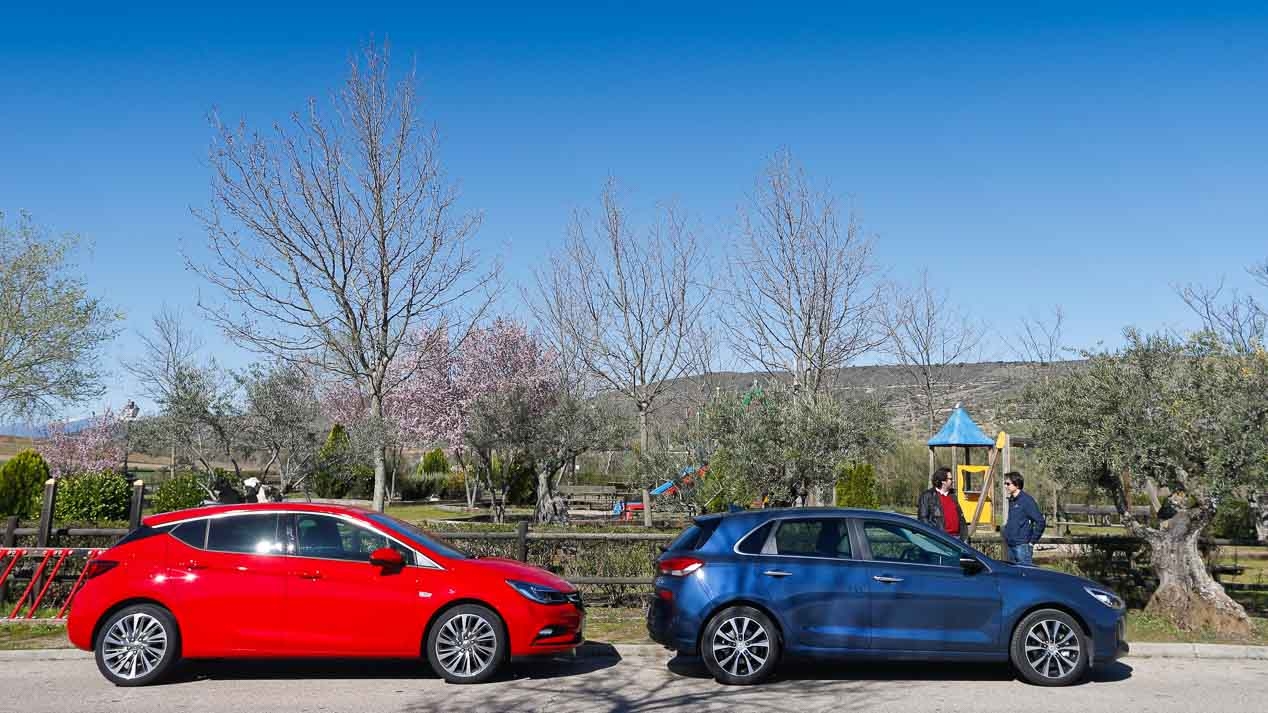
Hyundai launches model not only, also motor. And what motor. Underway, and during the early stages, may not seem as resolute as our measurements confirm then, when our Technical Center thoroughly explores all possibilities. Maybe I left that impression so thin it is, because it is one of those engines have to look to the rev counter to see whether or not started. In that sense, it is not that of the Opel Astra engine is not a very, very balanced rotation, but feel more mechanical interference in the interior, but its vibration mild. Also influences the first impression of being much more temperamental engine bourgeois his way to deliver power and torque, and that is, This new T-GDi Hyundai is so powerfully elastic That lends itself to a genuine driving turbodiesel: Rarely you find reasons to stretch beyond medium engine speeds, because from the very idle and for the next 3,000 rpm, is linear, constant and decisive: a lot of strength, but minimal effect turbo, like a much larger engine. Upstairs, though, it is the 1.4 Turbo 150 hp Opel which blunts progressing to cut more regularly and power over the past 2,000 rpm rotation.
| BENEFITS | Hyundai i30 1.4 T.GDI | Opel Astra 1.4 Turbo |
| Acel. 0-100 km / h | 8.53 s | 9.28 s |
| Acel. 0-1000 meters | 29.6 s | 30.2 s |
| Overtaking 80-120 km / h | 6.56 s | 7,95 s |
| Loudness 100 km / h | 68 dB | 66 dB |
| Loudness 120 km / h | 71.0 dB | 69.6 dB |
| Braking from 140 km / h | 67.5 m | 69.3 m |
| Weight scale | 1,341 kg | 1,296 kg |
Opel Astra 1.4 Turbo: better fuel road
It also contributes to the immediacy with which it responds and changes of pace the Hyundai i30 developments ratio change, shorter and closed feature that provides exceptional pleasure that it offers. Penalized by a sixth gear remaining liveliness, the Opel Astra will not feel much less slow to gain speed to blow lungs from low revs, but keep pace with the i30 involves more intensive use of gear shift, incidentally, excellent guided. Yes, more open that change, the lighter weight and better aerodynamics are grains of sand that help you get a better consumption on the road, while the Hyundai i30 chest out getting balance in city average.
| CONSUMPTION | Hyundai i30 1.4 T.GDI | Opel Astra 1.4 Turbo |
| Consumption city | 6.7 l / 100 km | 7,2 l / 100 km s |
| Consumption Highway | 5,9 l / 100 km | 5.4 l / 100 km |
| average consumption | 6.2 l / 100 km | 6,1 l / 100 km s |
It has little to prove and the Opel Astra since the renewal of the range, for over a year. How much balance earned and what a good tuning chassis to feel a car as comfortable as effective, even if its 150 hp aspire to certain sporting pretensions, maybe you can throw in lack greater retention of damping paths that require continuous movements waist.
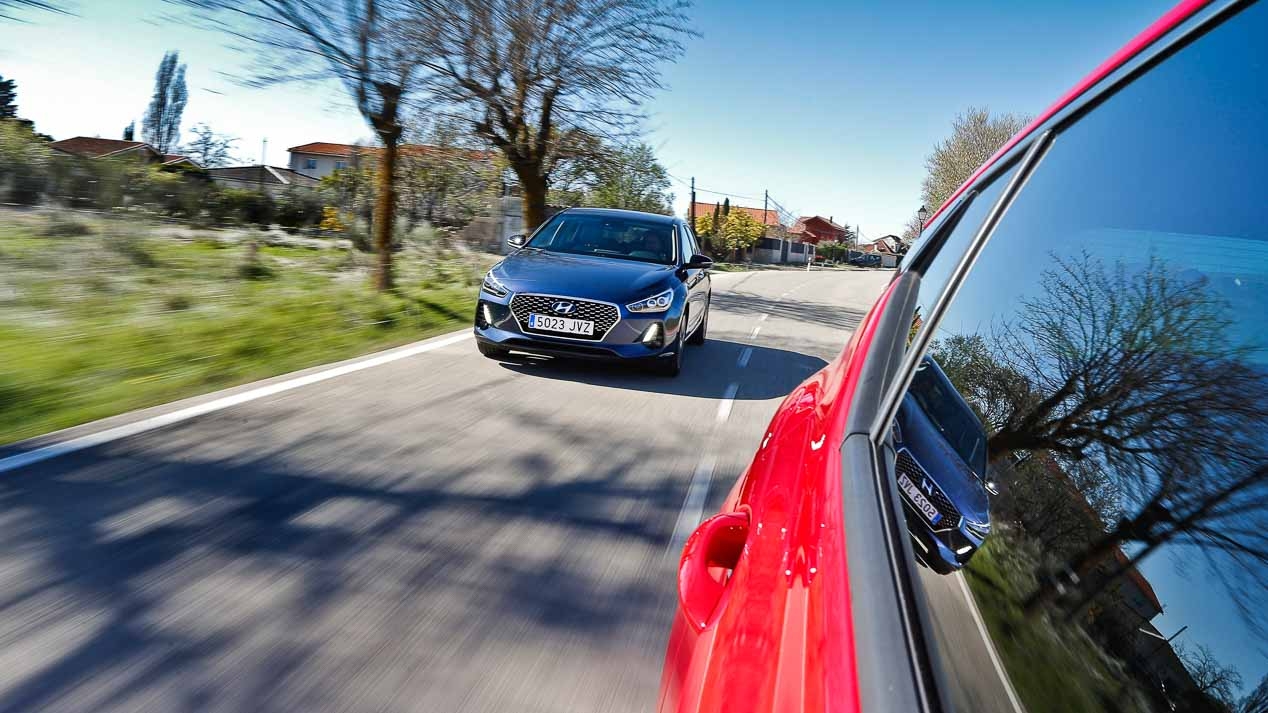
The bacheo quality is also impeccable in the Hyundai i30 and longitudinal and transverse movements the body are also very "clean" and demure, but, like the Opel Astra, regulation extension is somewhat "open". We must also highlight a excellent traction and a very good tuning electronics, active but very little intrusive. Together, and like the Astra, the i30 responds to a profile more gentrified than sports.
Hyundai i30 vs Opel Astra: space and trunk
entering assess and family space as compact cars, the Hyundai i30 is good in width and offers a bit intrusive transmission tunnel, but instead the height of legroom is not the most generous. Another nice touch with counts is the Output of air conditioning for the rear seats. He trunk, meanwhile, it offers a good capacity and versatility: It has a generous drawer under the floor, holding hooks and even a 12-volt socket.
| SPACE | Hyundai i30 1.4 T.GDI | Opel Astra 1.4 Turbo |
| front width | 142 cm | 140 cm |
| rear width | 138 cm | 135 cm |
| front height | 95-101 cm | 94-101 cm |
| rear height | 94 cm | 92 cm |
| Legroom | 69 cm | 76 cm |
| Trunk | 390 liters | 400 liters |
Meanwhile, Opel Astra offers generous legroom, from top of the category, a good level of height and an acceptable width. As for the trunk, we measured the Astra version with kit reparapinchazos where capacity is slightly higher than the Hyundai i30 with a volume on the segment average.
In short, it is clear that under the Hyundai i30 much and very good product the brand is not willing to devalue: just look at their prices, especially in their care and exotic finish Style where you’ll find everything from leather seats to standard browser, through countless elements of comfort and driving assistants in Opel Astra will have to add through options, but in return, he puts in the category exceptional product at a knockdown price.
| DISCOUNTED RATES (APRIL 2017) | Hyundai i30 1.4 T.GDI (from 20,600 to 22,575 €) | Opel Astra 1.4 Turbo (from 19,100 to 21,000 €) |
You may also like:
The Hyundai i30, opposite the Honda Civic and the VW Golf
Opel Astra vs Seat Leon, compact what it is better?
Hyundai i30 and is tuned in Nürburgring

